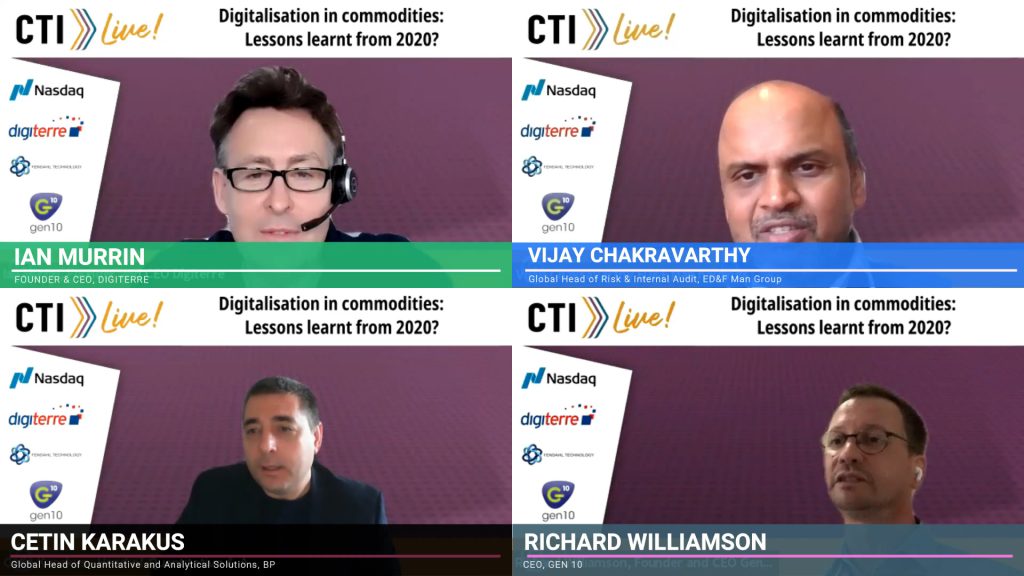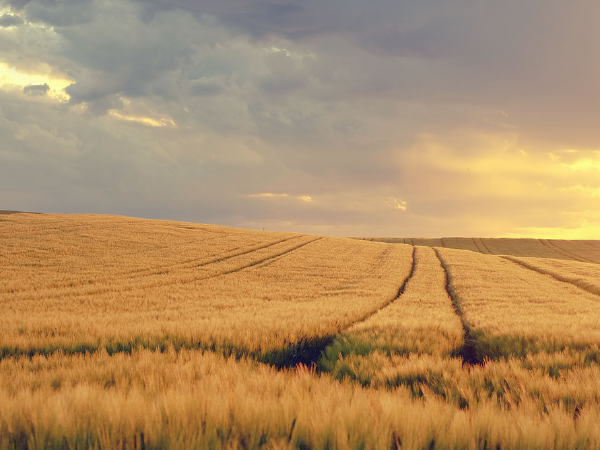Gen10 recently attended the commodity trading virtual event CTI Live! from 23 -25 March 2021. The event featured 6 fascinating panels across the 3 days, covering a wide range of relevant and topical subjects, from supply chain structure to climate change. Gen10 were invited to speak on digitalisation in commodities and on the new trade finance landscape.
In this first part of our quick event overview, we summarise 3 of these sessions:
Digitalisation in commodities: lessons learnt from 2020?
Featuring Gen10 CEO Richard Williamson alongside 3 other industry experts, this session opened with the question of who is winning in the current environment and why?
Richard explained that although it’s hard to describe anybody as “winners” from the devastating impact of a global pandemic, the commodity companies that performed best were those who had their systems, processes and people aligned before the crisis and were ready to handle the sudden shift to working from home. They were able to continue their work processes with less disruption.
A discussion of responses to the pandemic followed, including how switching to the cloud is becoming seen as a “currency of survival”. Organisations are also removing manual processing where they can and creating more complex automated workflows. In short, businesses are becoming more agile in response to the pandemic.
The panel also discussed one of the perennial challenges for complex organisations; how do they reduce organisational silos and allow people across the business to collaborate effectively? Richard was asked whether we are at risk of getting rid of these organisational silos just to create new digital silos?
He explained that older ETRMs did run the risk of creating these silos but modern systems are collaborative tools that encourage people to work as a team. Collaborative commodity management provides rich data to others in a timely fashion so breaks down these silos that could otherwise form. The modern ETRM is a communication tool that gives better context, helps the workforce do their jobs and provides management reports at the same time. Rather than focussing on reporting, you can give employees tools that make their job easier and you’ll get transparency as a result.
It should come as no surprise that the panel believe technology is empowering organisations and making many innovations possible. An example given was that whilst it might be possible to switch to renewable energy without digitalisation, it becomes much more tangible with digital tools. Another example was how organic produce is becoming more common without changes in farming practice – all because technology has made it much easier to demonstrate provenance.
The panel also discussed a wide range of technologies impacting the sector, including blockchain, retail investment platforms, cybersecurity and the overarching need for industry standardisation. Discover where the panel expects the future of digitalisation to be in the session recording.
Commodities and politics: is 2021 bringing more disruption than 2020?
Unsurprisingly, this panel session began with a discussion of Brexit; specifically its impact on trade with the EU, the UK’s biggest trading partner, as well as the slow process of the UK finding alternative outlets for its exports. Political factors such as the US relationship with China and the tariffs this involves are impacting on commodities and also mean that a UK trade deal is not necessarily as high a priority for the US as it is for the UK.
In terms of the commodities outlook, the panel explored why there may be inflationary pressure in 2021 as the rapid return to economic growth in China and US stimulus packages are both driving commodities demand. But politics and weather are both known unknowns and can have unexpected effects.
The panel also discussed supply dislocations, tax regimes, interest rates and investment trends outside of commodities, as well as their predictions for inflation and what this could mean for commodities. Watch the replay now to find out more.
Climate change: how can commodity trading catch up?
The multi-commodity panel discussed climate change in the context of both ags and energy. The energy transition, the move away from fossil fuels to more renewable energy sources, was high on the agenda. The panel anticipate that the energy transition is likely to take several decades and there will be more volatility over this period, as even if we are at the start of downwards demand slope, it will be a long slope and prices will be very choppy.
The panel also discussed current changes in energy markets and the opportunities they create. For example, although there is a sharp decline in coal demand, biogas and hydrogen are growing markets, which traders may enter to seize new opportunities.
Panellists also considered the ways agricultural commodities are responding to climate change, including the importance of reducing waste, reducing packaging and improving efficiencies such as through precision farming. On top of all this, the panel discussed carbon markets, the commodities needed to support the energy transition and potential regulation. Find out their thoughts on all of these topics in the session recording.
Want to read more?
Subscribe now for monthly updates
By submitting your details you agree that we can store your data and communicate with you. You can opt out of these communications at any time. Read all in our Privacy Policy.




